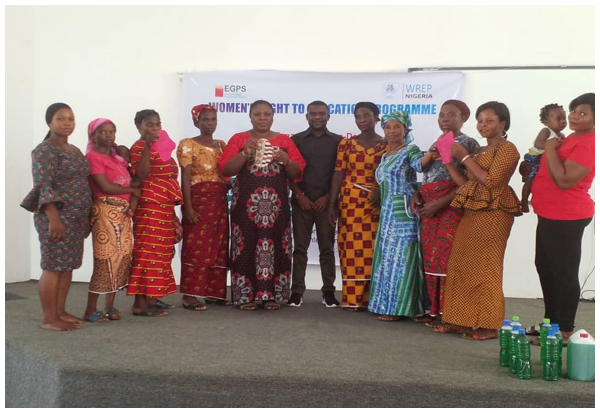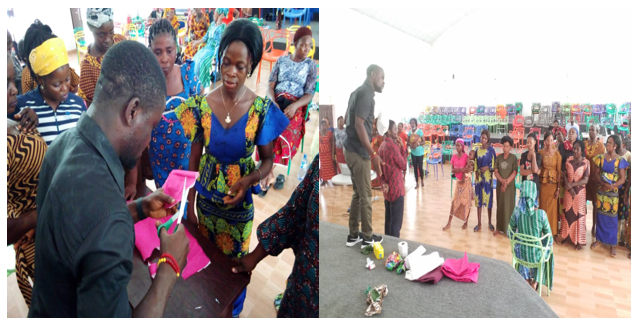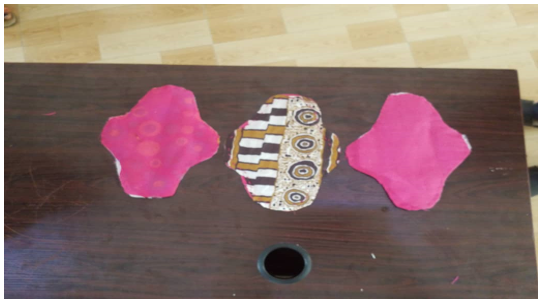WREP TRAINS COMMUNITIES ON MENSTRUAL HYGIENE MANAGEMENT IN BENUE

Erdoo Due
Women’s Right to Education Programme in Partnership with Extractives Global Programmatic Support trained women in selected communities in Benue State on menstrual hygiene management under the project; mitigating the impact of covid-19 on women and children in Artisanal and Small Scale Mining in North Central Nigeria.
The training which took place on the 30th April, 2021 at Benue Center for Enterprise Development and Innovation Makurdi, had a good turn up of 45 participants with 15 persons each drawn from three communities.
Mrs Violet Ochiekwu, Deputy Executive Director-WREP encouraged participants to use the training in helping their various communities as well as a source of income. She further expressed satisfaction with the turn up of participants stating that, it signified the desire for change.
In his presentation, Tine Agernor explained that menstrual cycle of women leads to pregnancy. He said,“different cultures hold different names for a woman’s period such as ‘won duen, shie, ueer, Eko’ among others. This is a necessity for procreation and should not be seen otherwise, as women tend to feel shameful and are often segregated in most communities attributed to belief systems.” For many women, pad is the best option for control of menstrual blood flow be it the comfortable or uncomfortable type, others prefer pieces of clothes, cotton wool, tissue and even leaves.

Terseen Mguenyi said, in Mbayion community, menstruation is seen as inconvenience and the blood serve as a source of badluck to anyone who sights it. Ruth Tor from Ushongo community said, “we no dey cook for family if dat blood dey comot, we no dey even fetch water for stream dat time and we dey stay far from men because man wey come near us dem say e go catch sickness.” Churches, social gatherings and even some mixed gender environs like schools, segregate the menstruating woman according to other participants.

Agernor, further condemned the use of leaves, tissue and cotton wool during menstruation as there are a lot of health hazards associated with them. The use of pieces of clothes was however considered for exceptional cases like when there is unavailability of pad. But if this must be used then, it should be cared for properly. Menstruating women according to him should also ensure proper change of pad after five (5) hours of usage, which is the ideal time while caring for their pubic areas and under-wears so as to avoid odour.
Dorcas Iorkusah encouraged women to be very careful and diligent in disposing menstrual waste. For those who use pad there should be proper wrapping of the waste pad in a polyethylene followed by incineration (do not flush a pad down the WC or Pit Toilet) but if the use of pieces of clothe is your choice then make sure you wash them with a pinch of salt and dry under the sun followed by storage in a safe place, she said.
Production of pad was an integral part of the training and it requires a white stain stay, pure cotton material and an unused pad which serve as the sample for production, Scissors, pressing pin and a thread/ needle or sewing machine. This was demonstrated by participants.
Participants including Verashe Azenda said “I be ignorant woman for village even though I sabi sew cloth I no know say I fit sew pad join so, now wey I don learn I no go dey use pieces of cloth again wey I dey use before, I go sew my pad use some come sell some for that my village make people know say I come Makurdi learn sometin come teach dem.”
Loveth Ishor said “I appreciate WREP for this opportunity, the knowledge is very useful and I will gladly extend tips on menstrual hygiene to my daughter. For the pad production I intend to teach some women in my community this skill because majority use pieces of clothes as well as generate money by making and selling to the neighbouring villages. If this training is every year I will always attend”she concluded.
WREP is a non-governmental organization that promotes the rights of women to education, focuses on peace building, good governance and rule of law as well as humanitarian issues.



